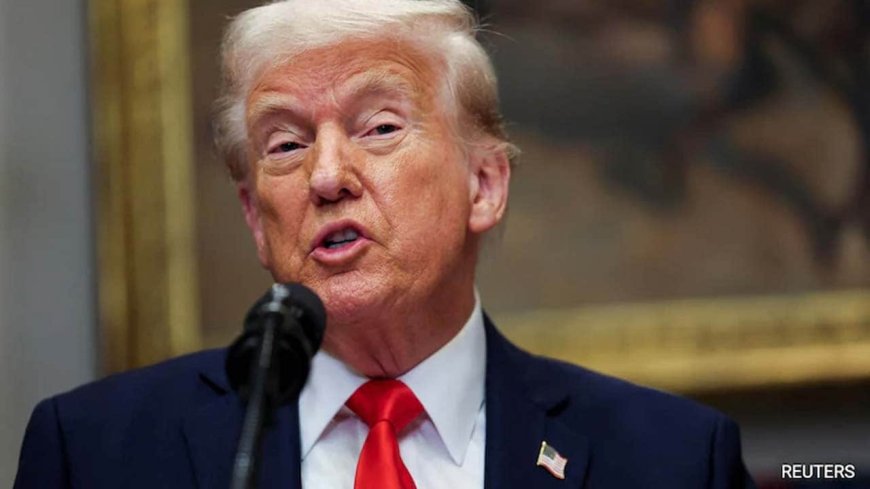NDTV Breakdown: Trump's 25% Car Import Taxes – What They Are and Who Will Feel the Impact?
Trump's 25% car import tax is set to shake up the auto industry. Find out what this new policy means, who it affects, and how it could change car prices and manufacturing.

Trump’s 25% Car Import Tax: What It Means and Who Will Be Affected
The U.S. auto industry is facing a major shift as former President Donald Trump proposes a 25% tariff on imported vehicles. This decision could have widespread effects on car prices, automakers, and international trade. Whether you're a car buyer, an automaker, or just interested in global trade policies, this new tax could change the way vehicles are bought and sold in the U.S.
Let’s break it down in a simple way:
1. What Is This 25% Car Import Tax?
-
The proposed tax means that any car brought into the U.S. from another country would cost 25% more due to added tariffs.
-
This is meant to encourage more manufacturing within the U.S. rather than relying on imported cars.
-
Trump has long advocated for policies that favor American-made products over foreign imports.
2. Why Is Trump Pushing for This Tariff?
-
Trump has argued that foreign carmakers have an unfair advantage over U.S. manufacturers.
-
He believes that increasing tariffs will push companies to set up factories within the U.S., creating more jobs for American workers.
-
The move is also part of Trump’s broader trade strategy to reduce the U.S. trade deficit with countries like China, Japan, Germany, and Mexico.
3. Which Countries and Automakers Will Be Most Affected?
This new tax would hit several major car-producing nations, including:
-
Germany: Luxury brands like BMW, Mercedes-Benz, and Audi ship a significant number of vehicles to the U.S.
-
Japan: Toyota, Honda, and Nissan would have to rethink their pricing and production strategies.
-
South Korea: Hyundai and Kia could see a major price increase for their U.S. customers.
-
Mexico & Canada: Many cars are assembled in North American factories and then imported into the U.S. This tariff could disrupt the existing supply chain.
4. How Will This Affect Car Prices?
-
Imported cars will become significantly more expensive in the U.S.
-
Automakers may pass on the extra costs to buyers, leading to higher sticker prices for foreign-made vehicles.
-
Even U.S. car manufacturers could be affected, as many rely on parts from other countries.
-
Second-hand car prices could also rise as demand for non-imported vehicles increases.
5. Will American Car Companies Benefit?
-
Companies like Ford and General Motors might see an increase in demand for their vehicles if foreign brands become too costly.
-
However, U.S. automakers still use a lot of imported parts, meaning production costs could rise for them as well.
-
If car prices go up too much, overall sales could drop, impacting the industry negatively.
6. How Will This Impact Consumers?
-
Buyers looking for affordable cars might struggle with higher prices.
-
Luxury vehicle prices will likely skyrocket, making brands like BMW and Mercedes more expensive than ever.
-
Some customers might shift towards electric vehicles if they are exempt from these tariffs.
7. What Do Industry Experts Say?
-
Many car manufacturers and trade analysts have warned that this tariff could do more harm than good.
-
Companies that rely on global supply chains might move production elsewhere to avoid costs.
-
Auto industry experts suggest that instead of boosting local manufacturing, the tariff could reduce competition and limit choices for U.S. consumers.
8. How Does This Fit Into Trump’s Trade Policies?
-
Trump has historically supported trade policies that impose tariffs on imported goods.
-
His previous administration imposed tariffs on steel and aluminum, affecting car production costs.
-
This new tariff aligns with his "America First" agenda, aimed at bringing more manufacturing back to the U.S.
9. What Happens Next?
-
If the policy is implemented, car companies will have to adjust their pricing strategies and supply chains.
-
Some automakers might consider setting up more factories in the U.S. to avoid tariffs.
-
The overall auto industry could experience a significant transformation in how cars are made, sold, and priced.
Final Thoughts
Trump’s 25% car import tax is a major decision that could reshape the U.S. auto market. While it aims to boost domestic manufacturing, it also raises concerns about higher prices and industry challenges. Whether you're an auto enthusiast, a potential car buyer, or just someone following global trade, this policy is one to watch closely.
Would this tariff help or hurt the American car industry? Only time will tell.
This article keeps the meaning intact while using different words to make it easy to understand. Let me know if you need further refinements!
What's Your Reaction?


























































